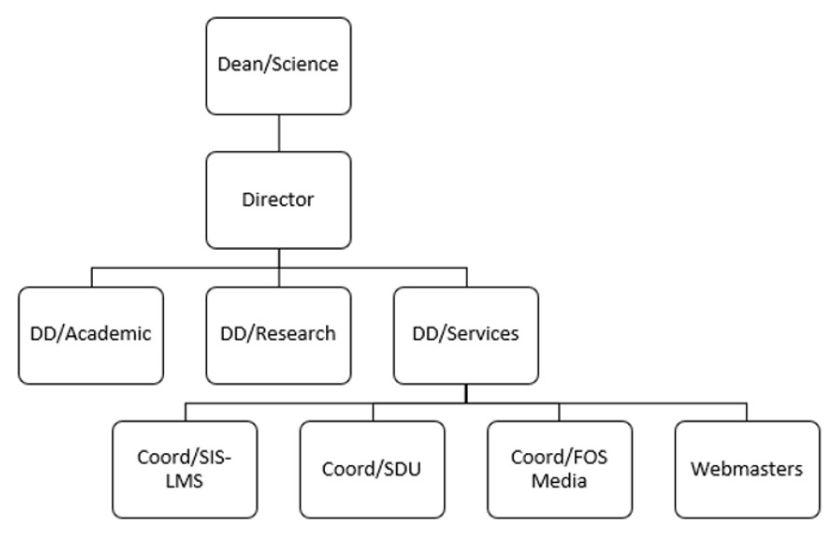IT Services Centre (ITSC) is a centre established in the Faculty of Science for providing, maintaining, and managing the technology infrastructure and services that support educational, research, and administrative activities of the Faculty. ITSC is governed by a Board of Management chaired by the Dean of the Faculty.
Our Objectives
>> Provide faculty wide IT services
>> Manage IT related degree programmes and courses
>> Support research activities requires computational facilities
Organization
ITSC is operated by a director under the guidance of the Dean. Three deputy directors handles, Academic, Research, and Services wings. Coordinators are appointed under the deputy directors for certain activities.

Meet the team
>> Dr Hiran H E Jayaweera/ Director
>> Dr A A Sunethra / Deputy Director/Academic
>> Dr Monika Madhavi / Deputy Director/Research
>> Dr W Sameera / Coordinator / HPC
>> Dr Dharshani Bandupriya / Deputy Director/Services
>> Dr Pasan Fernando / Webmaster
>> Mr Deshitha Wickramarathna / Webmaster
>> Dr Nadeeka Basnayake / Acting Webmaster
>> Dr Sachni Amarasekara / Coordinator/ FOS media
>> Dr Sunetra Abeysinghe / Coordinator/ SIS & LMS
>> Dr Lakmal Weerawarna / Coordinator/ Software Development Unit
Board of Management
Ex-officio:
>> Prof. Upul Sonnadara
>> Dr Hiran H E Jayaweera/ Director
>> Dr Dilruk Gallage/ Deputy Director/ Academic
>> Dr Monika Madhavi / Deputy Director/Research
>> Dr Dharshani Bandupriya / Deputy Director/Services
Members appointed by the Faculty Board:
>> Prof. DP Dissanayake
>> Prof. SSN Perera
>> Dr Sunethra Abeysinghe
>> Dr Pasan Fernando
>> Dr W Sameera
Research Management Committee/ HPC Management Committee
Ex-officio:
>> Dr Hiran H E Jayaweera/ Director
>> Dr Monika Madhavi / Deputy Director/Research
Members appointed by the Faculty Board:
>> Prof. DP DIssanayake
>> Prof. SSN Perera
>> Prof. IC Perera
>> Dr Pasan Fernando
>> Dr Sameera Vishwakula
>> Dr W Sameera / Coordinator / HPC
